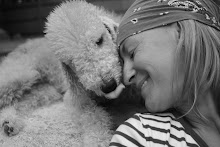Puppies DO pick up on and respond to tone of voice. A deep, stern voice is best for correcting your pup. I use the term, "uh uh!" when a pup has made a mistake, and follow that with a command such as, "no bark!" As soon as the pup is quiet, I switch to a higher, sing-songy voice and give a short statement of positive praise. In this example, I would say, "Good quiet!"
Remember that your new pup doesn't know his or her name or the word "come" or any other command for that matter. To "teach" your dog a new word, get into the habit of taking 20 pieces of kibble from the pup's daily food allotment. Set these aside to be used for daily word training. Start with your dog's name. For this game, your dog doesn't need to DO anything to get the reward (kibble). Simply say your dog's name and give him a piece of kibble. Repeat 20 times. Name - kibble. Name - kibble. Soon, your dog will swing his head around at the sound of his name. Why? Because something GOOD ALWAYS happens when he hears that sound combination.
The same will be true of the word "come" or "here" as your recall word. Don't waste this important word by saying it over and over and over again to your dog before he knows what the heck it means. And for him, it HAS to mean something GOOD will ALWAYS happen when he hears it. Why else would he want to come to you? He needs motivation. And for most dogs, food = motivation. So, 20 kibbles each day should be set aside for teaching your dog his recall word. The word doesn't have to be "come" or "here," especially if you've already messed up with that word. Any word you choose will do...like "pizza" or "cookie." Train your dog to RESPOND to the WORD before you expect him to DO anything, in the case of recall.
Don't overstimulate your dog will lots of idle chit chat when you greet him after being away from him for a period of time (for work, as an example). So many of us "teach" our dogs to go crazy when they see a human by acting like a crazy person when we greet them in those early weeks and months. After the pup learns to respond to all the excitement by jumping, running around, etc. we humans will grow irritated with their out-of-control behavior and begin to scold them for the very behavior WE created with our excited voices and hyper behavior.
Watch how dogs greet each other. You don't see many dogs running up to each other and jumping all over each other, barking crazily. This isn't how dogs "do" greetings. Well-socialized, savvy dogs are careful and quiet when they encounter an unknown dog. They avert their eyes and don't meet each other nose-to-nose. Rather, they will brush alongside each other's bodies and then sniff each other's bottoms. Once they've gotten a read on each other, they'll perhaps move on to a play bow or some other invitation to engage. Similarly, it's best to greet your dog in a quiet/silent, calm demeanor. Bend down to your dog's level and let him sniff you. This allows him to take in a lot of information about who you are and where you've been since he last saw you. Stroke him quietly and gently along the side of his body, giving him attention only if he remains calm as well.


No comments:
Post a Comment